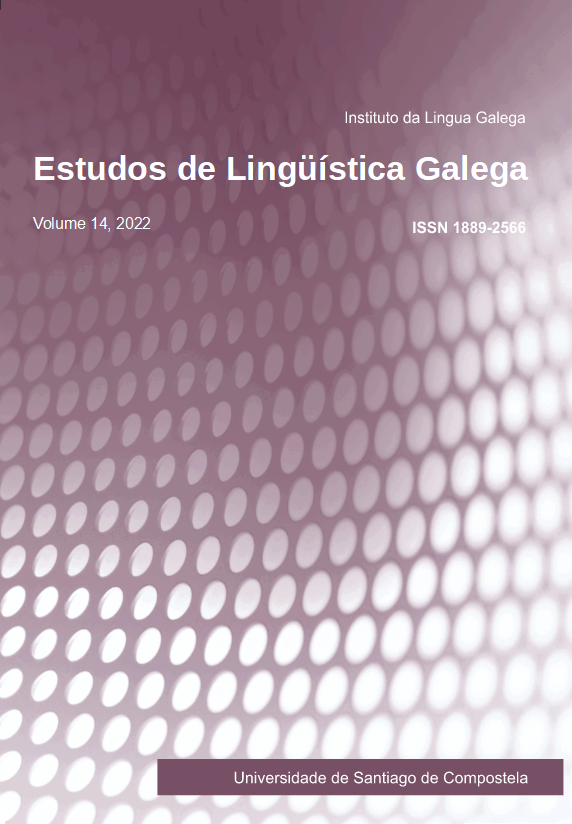"Àgora" in Minho dialect
Main Article Content
Abstract
This study analyses the metalinguistic negation marker àgora, which is productive in one Portuguese dialect area, the Minho dialect. Starting from the phonetic difference in this dialect between the temporal adverb agora and the negation marker àgora, in this work I present a detailed analysis of negative sentences with àgora. Following Horn (1985, 1989), Martins (2010) and Pereira (2010, 2011), I assume that these constructions convey a particular kind of negation: metalinguistic negation as defined by Horn (1985, 1989). My main goal is to show that syntactically, sentences with àgora in Minho dialect behave differently than in other dialect areas (the southern and central dialects), where metalinguistic negation is expressed by the marker agora. To identify these differences I undertake a comparative analysis and discuss a set of special features of àgora, which contrasts with other dialect areas in that àgora (i) is a pre-verbal marker with first-position requirements, (ii) strongly connects to the notion of ellipsis, (iii) only co-occurs with certain types of constituents, and (iv) has particular interpretative effects which favour discoursive prominence. The empirical basis for this dissertation consists mainly of my intuitions as a native speaker of the Minho dialect, while also analysing input from other speakers to confirm my own judgements when relevant.
Keywords:
Article Details
References
Ambar, Manuela (1999): “Aspects of the syntax of Focus in Portuguese”, em Georges Rebuschi / Laurice Tuller (eds.), The grammar of Focus. Amsterdam / Philadelphia: John Benhamins Publishing Company, 23-53.
Carrilho, Ernestina (2005): Explective ‘ele’ in European Portuguese dialects. Universidade de Lisboa. Tese de doutoramento.
Carrilho, Ernestina (2008): “Beyond doubling: overt expletives in European Portuguese dialects”, em Sjef et al. (eds.), Syntax and semantics: microvariation and syntactic doubling, vol. 36. Bingly: Emerald, 301-323.
Cinque, Giuglielmo (1999): Adverbs and functional heads: a cross-linguistic perspective. New York: Oxford University Press.
Costa, Ana / João Costa (2001): O que é um adverbio. Lisboa: Edições Colibri.
Duarte, Inês (1987): A construção de Topicalização na gramática do Português. Regência, ligação e condições sobre movimiento. Universidade de Lisboa. Tese de doutoramento.
Duarte, Inês (2003): “Relações gramaticais, esquemas relacionais e ordem de palavras”, em Maria Helena Mira Mateus et al. (eds.), Gramática da Língua Portuguesa, 7.ª edição. Lisboa: Caminho, 275-321.
Farkas, Donka / Kim B. Bruce (2010): “On reacting to assertions and polar questions”, Journal of Semantics 27, 81-118.
Haegeman, Liliane (2002): “Anchoring to speaker, adverbial clauses and the structure of CP”, em Simon Mauck / Jenny Mittelstaedt (eds.), Georgetown University Working Papers in Theoretical Linguistics 2, 117-180.
Horn, Laurence (1985): “Metalinguistic negation and pragmatic”, Language 61, 121-174.
Horn, Laurence (1989/2001): A natural history of negation. Chicago, 1989; CSLI Publications, 2001.
Houaiss, Antônio (2001): Dicionário Houaiss da língua portuguesa. Rio de Janeiro: Objectiva.
Jones, Bob Morris (1999): The welsh answering system. Berlin / New York: Mouton de Gruyter.
Martins, Ana Maria (2009): “The Portuguese answering system”, Comunicação apresentada na Universidade de Zurique. 16 de Outubro, 2009. Manuscrito, Universidade de Lisboa.
Martins, Ana Maria (2010): “Negação metalinguística (lá, cá e agora)”, em Ana Maria Brito et al. (eds.), Textos seleccionados do XXV Encontro Nacional da Associação Portuguesa de Lingüística, Lisboa: APL, 567-587.
Pereira, Sílvia (2010): O marcador de negação metalingüística ‘agora’ nos dialectos do Português Europeu. Universidade de Lisboa. Tese de mestrado.
Pereira, Sílvia (2011): “O marcador de negação metalinguística agora nos dialectos do Português Europeu”, em Armanda Costa / Pilar Barbosa / Isabel Falé (eds.), Textos seleccionados do XXVI Encontro da Associação Portuguesa de Lingüística. Lisboa: APL, 490-504.
Prieto, Pilar (2002): “Entonació”, em Joan Solà et al. (eds.), Gramàtica del catalá contemporani, vol. 1. Barcelona: Empúries, 393-462.
Rizzi, Luigi (1997): “The fine structure of the left periphery”, em Liliane Haegeman (ed.), Elements of grammar. Handbook in generative syntax. Dordrecht: Kluwer, 281-337.
Zubizarreta, María Luisa (1999): “Las funciones informativas: Tema y Foco”, em Ignacio Bosque / Violeta Demonte (eds.), Gramática descriptiva de la lengua española, vol. 3. Madrid: Espasa, 4215-4244.


